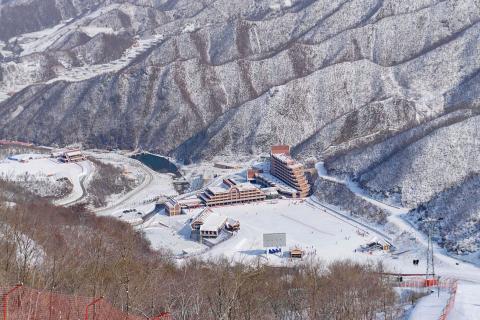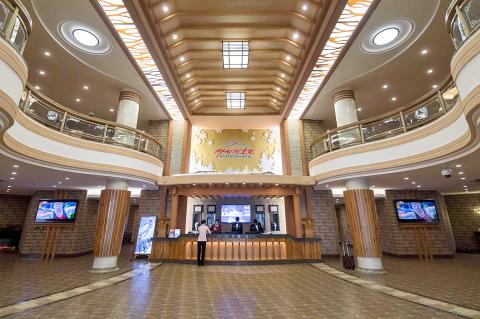On the ski fields of Mount Taehwa, groomed pistes snake down wooded hillsides to a luxurious hotel and a giant screen showing a North Korean army choir. But the runs are empty.
Work began on Masikryong ski resort, the only one in the North and the brainchild of Supreme Leader Kim Jong-un, after Pyeongchang in the neighboring South was awarded the 2018 winter Olympics.
The impoverished, nuclear-armed nation has ramshackle infrastructure and around 40 percent of its people are undernourished, according to the Global Hunger Index.

Photo: AFP/Ed Jones
But the luxurious resort boasts a wood-paneled reception and statues of winter sports athletes. Outside a large stone tablet proclaims: “The work of Dear Leader Kim Jong-un who devoted hard work and heart and soul to make our people the happiest and most civilized people.”
At a visitor center packed with pictures of Kim — including one of him using a chairlift, although without skis — guides credit him with giving on-the-spot guidance no fewer than 144 times over the course of construction.
The resort is a three-hour drive from Pyongyang, down a potholed concrete road that passes through unlit tunnels and which civilian work crews clear of snow and ice by hand after fresh falls.

Photos: AFP/Ed Jones
The warm comforts inside are a world away from the scenes outside the entrance checkpoint, where peasant farmers drag sleds loaded with firewood across frozen lakes, and ox-drawn carts are used for transport.
And — aside from the nursery slopes — it is deserted.
HAPPY LIVES
A second-hand Doppelmayr bubble lift, the ski boxes still stenciled with Ischgl, its original Austrian home, takes visitors to the top of Mount Taehwa, where a handful of curious Westerners enjoy the thrill of having almost an entire resort to themselves.
With a 700m vertical drop, the skiing compares favorably to other destinations in neighboring China or South Korea.
At one point on a weekend afternoon in peak season, Swede Patrik Hultberg was the only skier on the slopes, he said. “That’s really cool. I wish I could experience it more, hitting new pistes and there’s nobody there.”
Norwegian software developer Lars Eidnes has previously snowboarded in Iran and Kyrgyzstan. “If you want to escalate from there, then you come to DPRK,” he said.
Day passes for foreigners cost almost US$100, while for citizens of the Democratic People’s Republic of Korea — around 100 of whom were on the single nursery slope — they are priced at the equivalent of about US$30 at free-market rates.
By some estimates that approaches an ordinary worker’s monthly salary. But most will go on group trips organized by their work unit, school or organization, at zero or minimal cost.
After trying skiing for the first time, ship’s captain Kwak Jong-song said he found it “refreshing.”
“I would like to thank our Supreme Leader Kim Jong-un who is giving his whole devotion to our people’s happy lives,” he said.
Ordinary North Koreans normally only ever express officially-sanctioned views when speaking to foreigners.
WHITE ELEPHANT?
Resort executives say it sees 70,000 visitors a year. Such figures are hard to square with the uncrowded vistas, but hotel director An Song-ryol insists it is profitable.
“We do not mind the cost if it is for the improvement of the welfare of our people,” he said. “We do not calculate.”
Pyongyang has a byungjin policy of “simultaneous development,” meaning pursuing both GDP growth and nuclear weapons at the same time, even though it is subject to multiple sets of UN sanctions over its atomic and missile programs — among them a ban on luxuries, including snowmobiles and “recreational sports equipment.”
At a parade this month for the 105th birth anniversary of founder Kim Il-sung it displayed an arsenal of devices, including a suspected new intercontinental ballistic missile, as well as floats showing mock-ups of prestige property projects.
Masikryong was part of a regional development plan and driven by authorities’ view that a prosperous country should have a ski resort, said Nick Bonner, director of specialist North Korea travel agency Koryo Tours, which offers it among its destinations. “So they built it.”
“It’s not busy, it’s never been busy,” he told AFP. “But it’s not quite a white elephant either. It’s going to take time.”
But Andrei Lankov, director of Web site NK News and professor at Kookmin University in Seoul, said Pyongyang’s tourism expectations have been “absolutely unfounded” and “nearly comical”.
Kim Jong-un went to school in Switzerland, he pointed out. “He just decided to emulate what he saw there,” he said. “He saw wonderful mountains in Korea, which are indeed beautiful, and he said why not make our country into a tourist destination like Switzerland so we can make a lot of money like Switzerland does.”
The incongruity of the situation is not lost on some Masikryong visitors.
Norwegian Eidnes, 29, said he had been treated “like a king” at Masikryong.
“It’s very opulent, things are very nice,” he added. “That’s a sharp contrast to normal life for everyone. It’s been on our minds.”

June 23 to June 29 After capturing the walled city of Hsinchu on June 22, 1895, the Japanese hoped to quickly push south and seize control of Taiwan’s entire west coast — but their advance was stalled for more than a month. Not only did local Hakka fighters continue to cause them headaches, resistance forces even attempted to retake the city three times. “We had planned to occupy Anping (Tainan) and Takao (Kaohsiung) as soon as possible, but ever since we took Hsinchu, nearby bandits proclaiming to be ‘righteous people’ (義民) have been destroying train tracks and electrical cables, and gathering in villages

Dr. Y. Tony Yang, Associate Dean of Health Policy and Population Science at George Washington University, argued last week in a piece for the Taipei Times about former president Ma Ying-jeou (馬英九) leading a student delegation to the People’s Republic of China (PRC) that, “The real question is not whether Ma’s visit helps or hurts Taiwan — it is why Taiwan lacks a sophisticated, multi-track approach to one of the most complex geopolitical relationships in the world” (“Ma’s Visit, DPP’s Blind Spot,” June 18, page 8). Yang contends that the Democratic Progressive Party (DPP) has a blind spot: “By treating any

Swooping low over the banks of a Nile River tributary, an aid flight run by retired American military officers released a stream of food-stuffed sacks over a town emptied by fighting in South Sudan, a country wracked by conflict. Last week’s air drop was the latest in a controversial development — private contracting firms led by former US intelligence officers and military veterans delivering aid to some of the world’s deadliest conflict zones, in operations organized with governments that are combatants in the conflicts. The moves are roiling the global aid community, which warns of a more militarized, politicized and profit-seeking trend

This year will go down in the history books. Taiwan faces enormous turmoil and uncertainty in the coming months. Which political parties are in a good position to handle big changes? All of the main parties are beset with challenges. Taking stock, this column examined the Taiwan People’s Party (TPP) (“Huang Kuo-chang’s choking the life out of the TPP,” May 28, page 12), the Democratic Progressive Party (DPP) (“Challenges amid choppy waters for the DPP,” June 14, page 12) and the Chinese Nationalist Party (KMT) (“KMT struggles to seize opportunities as ‘interesting times’ loom,” June 20, page 11). Times like these can